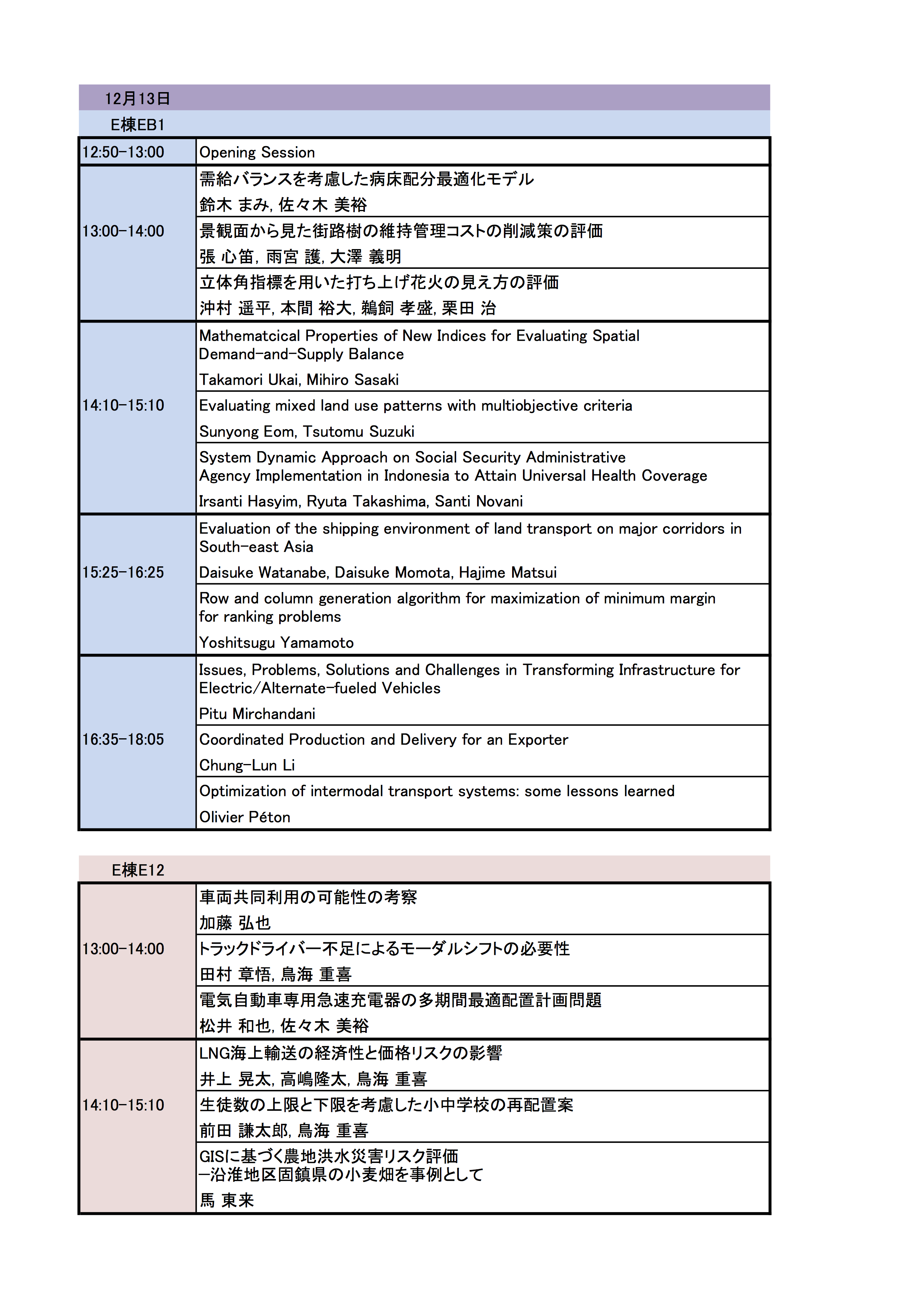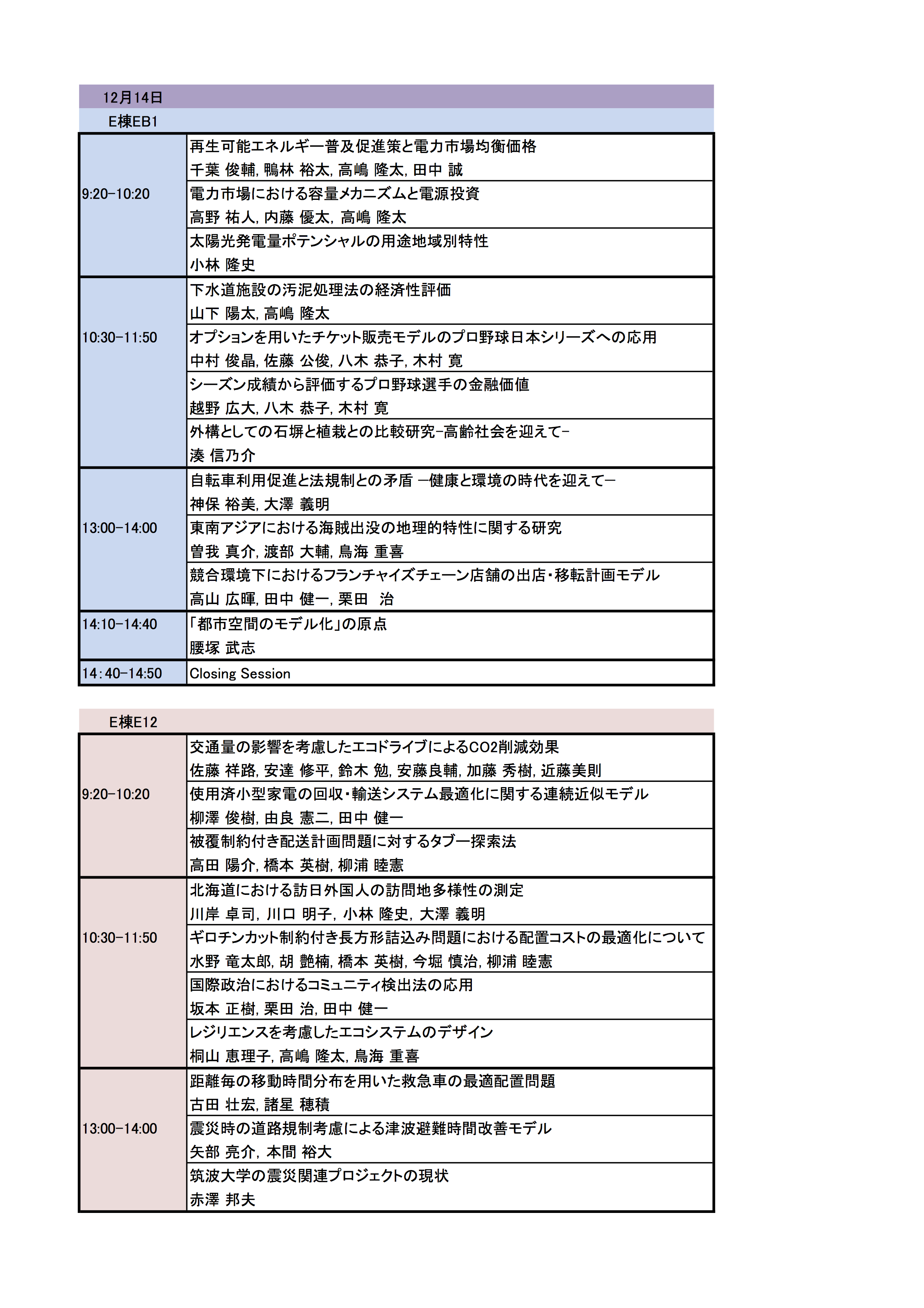スケジュール(PDF版)
招待講演
- Prof. Pitu Mirchandani
- Issues, Problems, Solutions and Challenges in Transforming Infrastructure for Electric/Alternate-fueled Vehicles
- [click here to see the abstract]
Author: Pitu Mirchandani
Abstract: There is much reason to believe that vehicles of many individuals and organizations will be transformed to vehicles that utilize alternative fuels which are more sustainable. The electric vehicle (EV) is a good candidate for this transformation, especially which “refuels” by exchanging its spent batteries with charged ones. Unfortunately, although there is much research gone into technologies of EVs and alternative-fueled vehicles, little effort have gone into designing the “refueling” infrastructure. This presentation discusses the design and operational issues that must be addressed, principally the issues related to the limited driving range of each electric vehicle’s set of charged batteries and the possible detouring for battery exchanges. In particular, the talk will address the optimization and analysis of infrastructure design alternatives dealing with (1) the routing of vehicles from origins to destinations, (2) the optimum locations of battery-exchange stations, and (3) the recharging capacity and operations management of battery-exchange infrastructure. Some infrastructure design and optimization models, and some results, will be discussed in this talk as well as challenges that lie ahead.
Abstract: There is much reason to believe that vehicles of many individuals and organizations will be transformed to vehicles that utilize alternative fuels which are more sustainable. The electric vehicle (EV) is a good candidate for this transformation, especially which “refuels” by exchanging its spent batteries with charged ones. Unfortunately, although there is much research gone into technologies of EVs and alternative-fueled vehicles, little effort have gone into designing the “refueling” infrastructure. This presentation discusses the design and operational issues that must be addressed, principally the issues related to the limited driving range of each electric vehicle’s set of charged batteries and the possible detouring for battery exchanges. In particular, the talk will address the optimization and analysis of infrastructure design alternatives dealing with (1) the routing of vehicles from origins to destinations, (2) the optimum locations of battery-exchange stations, and (3) the recharging capacity and operations management of battery-exchange infrastructure. Some infrastructure design and optimization models, and some results, will be discussed in this talk as well as challenges that lie ahead.
- Prof. Chung-Lun Li
- Coordinated Production and Delivery for an Exporter
- [click here to see the abstract]
Author:Renato E. de Matta, Vernon N. Hsu, Chung-Lun Li
Abstract: We consider an exporter who produces multiple products at geographically separated production plants to meet a stream of deterministic overseas demands over a planning horizon. Each production plant uses either a direct delivery mode, which sends pre-loaded cargos of a product directly from its production facility to the ocean port, or a consolidated delivery mode where products are consolidated into outbound ocean cargos at the facility of a third party logistics firm and delivered to the ocean port. The exporter’s problem is to develop a minimum cost production and delivery plan for the entire supply chain over a finite planning horizon. We model the problem as a mixed integer program and show it to be NP-hard even for the case with one production plant. Two distinct but related decisions characterize the problem, namely the product delivery mode selection decision and the production scheduling decision. We exploit the natural separation of these decisions in a Benders decomposition solution procedure. An important finding of this study is that the exporter can extract the most value from integrating consolidated deliveries in the production and distribution plan when plants have modest production costs and demand variability is high.
Abstract: We consider an exporter who produces multiple products at geographically separated production plants to meet a stream of deterministic overseas demands over a planning horizon. Each production plant uses either a direct delivery mode, which sends pre-loaded cargos of a product directly from its production facility to the ocean port, or a consolidated delivery mode where products are consolidated into outbound ocean cargos at the facility of a third party logistics firm and delivered to the ocean port. The exporter’s problem is to develop a minimum cost production and delivery plan for the entire supply chain over a finite planning horizon. We model the problem as a mixed integer program and show it to be NP-hard even for the case with one production plant. Two distinct but related decisions characterize the problem, namely the product delivery mode selection decision and the production scheduling decision. We exploit the natural separation of these decisions in a Benders decomposition solution procedure. An important finding of this study is that the exporter can extract the most value from integrating consolidated deliveries in the production and distribution plan when plants have modest production costs and demand variability is high.
- Prof. Olivier Péton
- Optimization of intermodal transport systems: some lessons learned
- [click here to see the abstract]
Author:Olivier Péton
Abstract: Why are intermodal transport optimization problems so difficult to model and solve?
Why are mathematically optimal solutions not always applied in practice?
What are the benefits and limitations of operations research on these problems?
We will try to answer these questions by drawing upon several case studies in the field of urban logistics, rural logistics, demand responsive transport and the pooled distribution of goods. All these case studies concern transport of passengers or goods between a set of collection points and a set of delivery points. A common feature is that transportation requests borrow two or more vehicles from their collection point to their delivery point. This creates difficult precedence and synchronization constraints between routes, vehicles or sites.
After a quick overview of optimization techniques used to solve these cases (branch-and-price, large neighborhood search, decomposition into easier sub-problems), we present some experimental results and provide feedback on the actual application of these results.
Abstract: Why are intermodal transport optimization problems so difficult to model and solve?
Why are mathematically optimal solutions not always applied in practice?
What are the benefits and limitations of operations research on these problems?
We will try to answer these questions by drawing upon several case studies in the field of urban logistics, rural logistics, demand responsive transport and the pooled distribution of goods. All these case studies concern transport of passengers or goods between a set of collection points and a set of delivery points. A common feature is that transportation requests borrow two or more vehicles from their collection point to their delivery point. This creates difficult precedence and synchronization constraints between routes, vehicles or sites.
After a quick overview of optimization techniques used to solve these cases (branch-and-price, large neighborhood search, decomposition into easier sub-problems), we present some experimental results and provide feedback on the actual application of these results.
12月13日(土)

12月14日(日)

